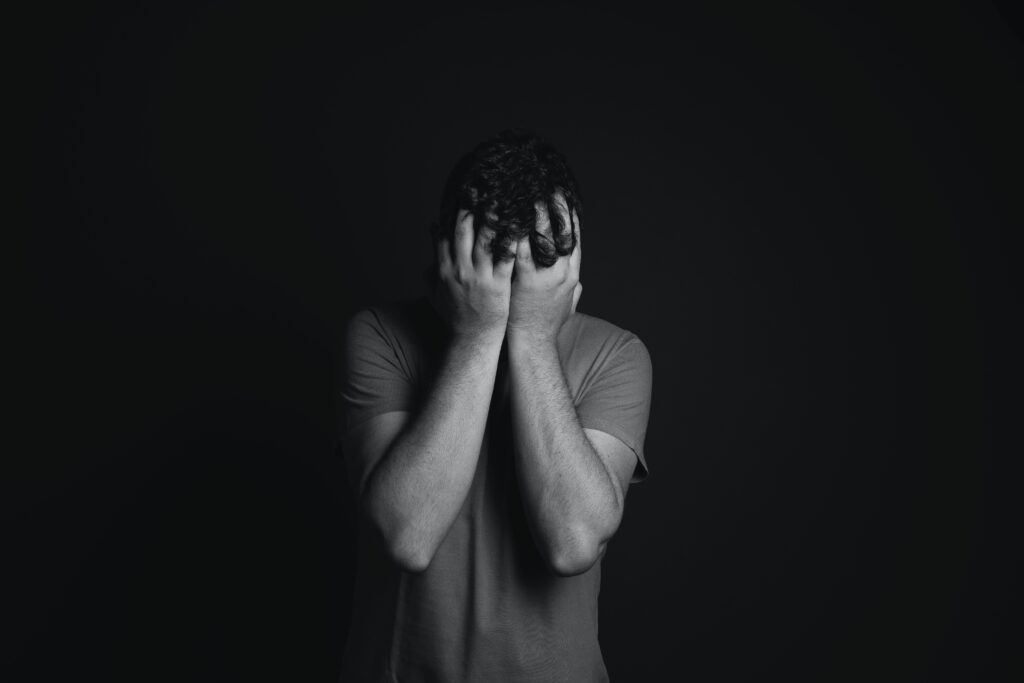11 Signs Your Mental Health Is Worsening

WARNING: This article contains mentions of suicide and suicidal thoughts.
In a world that prioritizes productivity over mental health, it is often the case that people neglect taking care of themselves. In consequence, people may not come to actually know themselves and their bodies. This becomes a problem when you can’t recognize the signs that your body is giving you to tell you that you need to take care of yourself.
Oftentimes, when this goes on long enough, it can result in physical and mental illnesses. Your mind and body don’t suddenly become ill, it is a slow process that can be managed, stopped and, sometimes prevented if you can recognize the early signs.
Unfortunately, it is often the case, especially when it comes to mental health, that the signs experienced are actually warning signs that your mental health is deteriorating.
This article is for educational purposes only, it is not intended to diagnose or treat anything. If you relate to any of the following signs please contact a mental health professional for further help and instructions.
For the purpose of helping those who may feel like their mental health is worsening but are not sure, here are 11 signs that warn you that your mental health may be going on a downward spiral.
1- Sleep and Appetite changes
Believe it or not, sleep and appetite changes can mean that your mental health is worsening.
According to Harvard Health, anxiety, depression, bipolar disorder, and attention deficit hyperactivity disorder (ADHD) are all linked to giving people sleeping problems. Whether those be sleeping too much or too little.
When it comes to sleep deprivation or sleeping too little, Healthline states that “Science has linked poor slumber (under 9 hours) with a number of health problems, from weight gain to a weakened immune system”.
These health problems include memory issues, trouble with thinking and concentration, chronic mood changes which can lead to anxiety and depression, increased risk of getting into accidents, weakened immunity, high blood pressure, the risk for diabetes, weight gain, low sex drive, risk of heart disease, and poor balance.
On the other hand, excessive oversleeping (over 9 hours regularly) can lead to cognitive impairment, depression, increased inflammation, increased pain, impaired fertility, higher risk of obesity, higher risk of diabetes, higher risk of heart disease, higher risk of stroke, and higher all-cause mortality says Amerisleep.
The prolonged psychological causes and mental illnesses, says Healthline, that cause appetite changes are sadness, depression, grief, anxiety, boredom, stress, and anorexia nervosa.
Eating too much can cause weight gain, issues with your digestive system, may increase disease risk, impair brain function, among others.
Eating too little can cause malnutrition, fatigue, hair loss, reproductive difficulties, growth problems, depression, etc.
2- Mood changes

Do you have frequent mood swings, sometimes unexplained? Erratic mood changes, that are intense in nature, may be a sign that your mental health is worsening. Because mood swings can occur due to stress, an accident, an injury, allergies, hormones, medication, illness, and developmental stages, it is considered common.
If the mood changes persist and are frequent, it tells doctors that it may be something else. According to VeryWell Mind, possible mental health illnesses associated with mood changes are depression, bipolar disorder, borderline personality disorder, and Alzheimer’s.
Mood swings in depression tend to fall on the side of lethargy and not wanting to do much or losing interest in things. With bipolar disorder, mood swings tend to move from one extreme to another, from high energy to lethargic depression.
Borderline personality disorder is also characterized by mood swings that can last from hours to days and include risky behavior, extreme reactions, dissociative symptoms, anger issues, self-harming, and feeling empty.
3- Withdrawal & Avoiding people or responsibilities
Do you find yourself avoiding people and things that you enjoy for long periods of time? This withdrawal is, oftentimes, that your mental health is deteriorating or a sign of depression. Because the person feels broken, misunderstood, and has lost all pleasure in activities and being with people, the person withdraws into their own world.
Withdrawing may seem like a good idea at first until it starts to negatively affect your daily life. When you stop meeting deadlines and even going to work, when you retract from all social contact, stop eating, and stop taking care of yourself.
What withdrawing actually does is worsen the illness because it amplifies the brain’s stress response, says Stephen Ilardi, Ph.D., associate professor of psychology at the University of Kansas in a WebMD article.
“When we’re clinically depressed, there’s a very strong urge to pull away from others and to shut down,” says Ilardi author of books including The Depression Cure, “It turns out to be the exact opposite of what we need.”
“In depression, social isolation typically serves to worsen the illness and how we feel,” Ilardi says,”Social withdrawal amplifies the brain’s stress response. Social contact helps put the brakes on it.”
If you do not suffer from depression necessarily, extreme withdrawal can lead to it and other mental illnesses.
4- Excessive worrying, fear, or nervousness

Everyone has worries, it is a normal part of life. But when these worries become excessive and take over your life it may mean that you are living with anxiety.
Generalized anxiety disorder or GAD, is a mental illness where you are constantly and chronically in a state of worry, anxiety, stress, and tension. Every little thing can become an apocalyptic scenario in your mind.
Not getting a call or text quickly enough can have you thinking that you either did something wrong or that the relationship with that other person is over even though there has been no indication of that. An off-hand comment can lead you to think that you are the worst person in the world or give you fuel to imagine a worst-case scenario which ignites your anxiety more.
“The anxiety of GAD is diffused—a general feeling of dread or unease that colors your whole life”, states HelpGuide on its site, “This anxiety is less intense than a panic attack, but much longer-lasting, making normal life difficult and relaxation impossible. It drains your energy, interferes with sleep, and wears your body out.”
According to HelpGuide, the difference between GAD and normal worrying is that GAD is excessive, intrusive, persistent, and disruptive. An example of this is if your worrying gets in the way of your daily activities, you worry all day, you sometimes wake up at night with chest pains or palpitations, feeling like your thoughts are uncontrollable, you have a constant feeling of apprehension or dread, etc.
If this seems like you, you may be suffering from GAD or on the way to developing anxiety if nothing is done.
5- Feeling excessively sad or low
Have you been feeling excessively sad, low, angry, irritable, or even empty lately? You may be suffering from depression or on your way to developing it.
“Depression is a longer-term mental illness”, says an article on Healthline, “It impairs social, occupational, and other important areas of functioning. Left untreated, symptoms of depression may last for a long time”.
The feelings that depression creates in you affect the entirety of your life. They are all-encompassing and make it hard to find enjoyment or pleasure in life.
These emotions are coupled with other symptoms that Healthline says can include constant feelings of sadness, irritability, fatigue, changes in sleeping or eating patterns, difficulty concentrating, loss of interest, and enthusiasm for things that used to provide pleasure; feelings of deep, unwarranted guilt; physical symptoms, such as headaches or body aches that do not have a specific cause, feelings of worthlessness, constant thoughts about death, and suicidal thoughts or actions.
If some of these symptoms look familiar to you, and they are affecting your daily life, it may be time to contact a mental health professional.
6- Difficulty perceiving reality

If you or someone you know are starting to have difficulty perceiving reality, this might be a sign that your mental health is worsening or that you may have an underlying mental illness. Having trouble telling what’s real from fantasy includes having hallucinations, delusions, or thought disorders.
According to ReachOut Schools, this may mean that you are suffering from psychotic disorders which affect around two in every 100 adults between the ages of 15 and 30. The most common psychotic disorders include schizophrenia, bipolar disorder, and major depression with psychotic features. Although one may also suffer from a psychotic episode due to stress and not necessarily suffer from a psychotic disorder.
ReachOut Schools gives a list of signs that signify that the psychotic disorder has become a problem. These are withdrawal from family and friends, inability to maintain employment or engage in studies, confusion, confused speech, inappropriate or erratic behavior, and reactions, hearing voices when alone or that others cannot hear, mood swings, and seeing things that are not there.
7- Overuse of substances
Have you noticed that you’ve been drinking a little too much lately or smoking more than before? Overusing substances can be a clear sign that your mental health is deteriorating.
Usually, when people turn to the use of substances it is because they cannot cope with their situation anymore. They usually turn to substances in order to escape their reality or relieve (numb) the pain they are feeling.
When these substances become overused, meaning used multiple times a day, maybe even all day, and disrupting everyday life, it becomes a problem and a threat to their lives. Overusing substances can distort reality, make people irritable, angry, even depressed.
If your use of substances has increased significantly, it may be a sign that you need to contact a mental health professional for help.
8- Multiple physical ailments without obvious causes

Do you feel a certain ache or pain that neither you nor your doctors can explain? This may be your body telling you that you may be suffering from a mental illness.
Mental illness can cause physical symptoms to arise like headaches, migraines, stomach problems, chest pains, palpitations, sleeping issues, fatigue, pain, muscle tension, and soreness. This is because most mental illnesses are created and triggered by the high-stress response of the “flight, fight, or freeze mode” you go into when you feel threatened.
The hormones that these high-stress levels can produce affect other parts of the body that can end up creating physical ailments that have no apparent physical cause. For example, anxiety can cause digestive issues like heartburn and heart palpitations. Depression can cause headaches and fatigue.
If your physical symptoms can’t be explained by a physician then it may be time to contact a mental health professional for evaluation.
9- Inability to carry out daily activities
When the mind can no longer deal with the stress of everyday life, one of the responses is to slowly start to avoid or neglect daily activities and people.
“A major early warning sign that suggests that a person is dealing with a mental illness or psychological disorder is an inability to perform daily tasks”, states United Energy Workers Healthcare (UEW Healthcare) on its website.
According to UEW Healthcare, a study published by the National Center for Biotechnology Information (NCBI) notes that the inability to cope with problems and perform the ordinary day-to-day tasks of life should be taken as a sign that a person might need to get professional help.
Some signs that you may be having trouble conducting day-to-day activities are having difficulty in getting dressed, bathed, grooming, preparing meals, doing basic household chores, difficulty in managing relationships, maintaining a safe home environment, and attending to obligations like school and work.
If you are not a person that has physical or mobility issues, the inability to carry out your daily activities may be caused by a mental illness, and it is recommended that you seek a mental health professional for help.
10- Problems with thinking

Are you having trouble concentrating, focusing, thinking straight, logically, and just generally having trouble in your thinking process? It may be a sign that your mental health is worsening or that there is already a mental health issue.
Some mental illnesses that cause problems with thinking are anxiety, depression, and schizophrenia.
“It’s normal to forget things once in a while as we age, but serious memory problems make it hard to do everyday things like driving, using the phone and finding your way home”, says the National Institute of Aging.
A few signs that you are having problems with thinking are asking the same questions over and over again, getting lost in places a person knows well, having trouble following recipes or directions, becoming more confused about time, people, and places; not taking care of oneself —eating poorly, not bathing, or behaving unsafely; having hallucinations or delusions.
If your thinking process is making it hard for you to live your life normally, it may be time to go to a physician or mental health professional.
11- Thinking of suicide
When the thought of suicide appears, it is a clear sign of bad mental health or state of mind. Thoughts of suicide arise when the person feels hopeless and life is seen as not worth living anymore. These thoughts and feelings can be caused by high levels of stress, trauma, or a mental illness.
Keep in mind that, in most cases, a very impactful situation or a prolonged chain of events that induces stress needs to happen in order for someone to even think of suicide. Therefore, if you are thinking of suicide you may be past your breaking point and need to seek help with a mental health professional immediately.
“Recognize that depression and hopelessness can distort your perceptions and reduce your ability to make good decisions”, says Mayo Clinic on its site.
If you are thinking of suicide please remember that feelings and emotions are temporary and that they can be treated so seek help before doing anything drastic.
“Don’t try to manage suicidal thoughts or behavior on your own”, states Mayo Clinic, “You need professional help and support to overcome the problems linked to suicidal thinking”.
Remember that it may take some time but with help, these feelings of hopelessness and worthlessness can be lifted and you can find joy again.
If you are feeling depressed or contemplating suicide please remember that you are not alone. Below are the hotlines you can call if you are thinking about suicide.
Suicide Hotlines:
America: 1-800-273-TALK (8255)
Canada: 1-866-531-2600
Australia: 13 11 14
United Kingdom: +44 (0) 8457 90 90 90
Beijing: 0800-810-1117
Hong Kong: +852 28 960 000
Japan/Tokyo: 81 (0) 3 5286 9090
Brazil: 55 11 31514109 or (91) 3223-0074
Mexico: 9453777
Germany: 0800 111 0 111
Russia: (495) 625 3101
India: 91-22-27546669
Iran: 1480
South Africa: 0800 12 13 14
This is only a short list of a few countries, however, there is always somebody to reach out to.
Do you identify with any of these signs? Do you have other signs that you would like to mention? Comment below and check out our YouTube channel for more interesting topics about psychology. Thank you for reading.

Sources:
American Psychiatric Association. (2018, July). Warning Signs of Mental Illness. Retrieved from https://www.psychiatry.org/patients-families/warning-signs-of-mental-illness
Blake, K. (2019, April 29). What Causes Loss of Appetite? Retrieved from https://www.healthline.com/health/appetite-decreased
Ferguson, S. (2020, June 30). Yes, Mental Illness Can Cause Physical Symptoms – Here’s Why. Retrieved from https://www.healthline.com/health/mental-health/mental-illness-can-cause-physical-symptoms#How-mental-stress-can-cause-physical-problems
Harvard Health Publishing. (2021, August 17). Sleep and Mental Health – Harvard Health Publishing. Retrieved from https://www.health.harvard.edu/newsletter_article/sleep-and-mental-health
Kandola, A. (2019, May 29). 9 signs and symptoms you’re not eating enough. Retrieved from https://www.medicalnewstoday.com/articles/322157
Mayo Clinic Staff. (2018, January 31). Are you thinking about suicide? How to stay safe and find treatment. Retrieved from https://www.mayoclinic.org/diseases-conditions/suicide/in-depth/suicide/art-20048230
National Alliance on Mental Illness. (n.d.). Warning Signs and Symptoms. Retrieved from https://www.nami.org/About-Mental-Illness/Warning-Signs-and-Symptoms
Osmun, R. (2021, October 11). Oversleeping: The Effects & Health Risks of Sleeping Too Much. Retrieved from https://amerisleep.com/blog/oversleeping-the-health-effects/
Preiato, D. (2020, May 04). 7 Ways That Overeating Affects Your Body. Retrieved from https://www.healthline.com/nutrition/overeating-effects
Reach Out Schools. (n.d.). Psychotic disorders. Retrieved from https://schools.au.reachout.com/articles/psychotic-disorders
Schimelpfening, N. (2020, November 25). What Might Be Causing Your Mood Swings. Retrieved from https://www.verywellmind.com/what-are-mood-swings-1067178
Segal, J., & Smith, M. (2021, October 12). Generalized Anxiety Disorder (GAD). Retrieved from https://www.helpguide.org/articles/anxiety/generalized-anxiety-disorder-gad.htm
Soong, J. (2021, July 8). Depression Traps: Social Withdrawal, Rumination, and More. Retrieved from https://www.webmd.com/depression/features/depression-traps-and-pitfalls
United Energy Workers Healthcare. (n.d.). Inability to Perform Daily Tasks. Retrieved from https://www.uewhealth.com/guide-mental-disease-elderly/symptoms-signs-mental-illness/inability-perform-daily-tasks/
Watson, S., & Cherney, K. (2020, May 15). 11 Effects of Sleep Deprivation on Your Body. Retrieved from https://www.healthline.com/health/sleep-deprivation/effects-on-body
Whelan, C. (2017, March 31). Depression vs. Sadness: What’s the Difference? Retrieved from https://www.healthline.com/health/depression/depression-vs-sadness





Responses